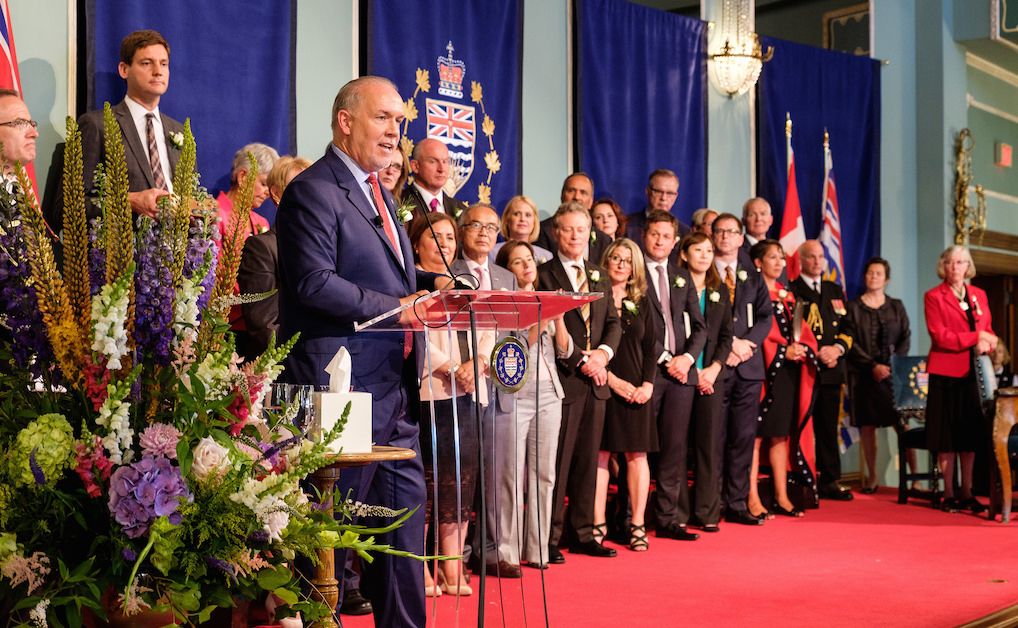British Columbia’s unions are hopeful for increases to minimum wage and improved workers’ rights with John Horgan’s NDP-Green coalition government.
Horgan and his cabinet were sworn in on Tuesday.
Irene Lanzinger, president of the B.C. Federation of Labour, said she hopes this new government will raise minimum wage to $15 an hour by sometime in 2019, a timeline consistent with announced changes in Alberta and Ontario. Alberta’s minimum wage is set to increase to $15 an hour in October 2018. Ontario is considering legislation that would see that same wage become effective in January 2019.
The NDP and the Green Party both support the increased minimum wage, she said.
Lanzinger called the increases a way to “immediately” improve the lives of the working poor. The province also needs to follow suit with nearby jurisdictions like Alberta and Seattle, where the minimum wage is already $15. It isn’t fair that British Columbians have a lower minimum wage when their cost of living is so high, she said.
But it can’t stop there, she said. Eventually, the minimum wage should be the same as the living wage. How that happens is a “completely appropriate and a good discussion to have,” Lanzinger said. She said the federation is looking forward to working with the Fair Wages Commission, which will study the issue.
The provincial Green party had named the establishment of such a commission as an election promise.
But Lanzinger also wants the government to tackle concerns that are “less on the public radar,” like changing the labour code to make it easier for people to join unions, calling unions the “key to reducing the gap between rich and poor.”
Lanzinger would also like to see stiffer penalties, including criminal charges and jail time, for employers whose negligence causes the injury or death of workers. Drivers face prison time when their negligence causes injury or death, she said. It should be the same for employers.
The new cabinet includes many ministers with past labour experience. Judy Darcy, former president of the Canadian Union of Public Employees (CUPE), was named to the newly created ministry of mental health and addictions. George Heyman, former president of the B.C. Government and Services Employees’ Union (BCGEU) was named minister of environment and climate change strategy. Minister of Citizens’ Services Jinny Sims was previously president of the B.C. Teachers’ Federation (BCTF).
While Lanzinger says the “deep knowledge” about labour these ministers will bring is helpful, it’s not necessary for advancing the rights of workers. It’s more important that government officials recognize the importance of unions, she said.
A former teacher, Lanzinger said she was pleased to see Rob Fleming appointed minister of education. Fleming was previously the education critic.
Glen Hansman, president of the BCTF, echoed Lanzinger’s approval. Fleming “doesn’t need to come up to speed” about the issues facing the education system, said Hansman.
The first priority needs to be making sure the B.C. government implements last November’s Supreme Court of Canada decision. The country’s highest court ruled against a 2002 law that removed language about class size and composition from teachers’ collective bargaining agreements, and forbade teachers from negotiating about those issues in the future. As part of the settlement, the government was supposed to provide money for districts to hire more teachers.
But that hasn’t happened, said Hansman. Many districts were “scrambling” in June when they learned they weren’t going to receive the money they had expected, he said. This includes large districts, like the Vancouver District School Board, that Hansman said didn’t find out about what they weren’t getting until the second-last week of school. This has thrown school organization into “disarray.”
Districts need that staff immediately, said Lanzinger.
“It is not optional,” she said. “It must be implemented and it must be implemented quickly. Frankly, that’s the best thing for kids in the province. And it’s also the law.”
Hansman also said he hopes the new government will have a less “adversarial” relationship with unions. The Liberals were known to “use the legislative hammer” to get things done, he said, calling their relationship with labour a “dark cloud” hanging over the province. He said he hopes this changes — especially as teachers’ collective bargaining agreement expires in 2019. Preparations for negotiations will begin soon, he said.
Hansman wasn’t the only union leader calling on the government to take action on education.
Paul Faoro, president of the Canadian Union of Public Employees (CUPE) BC said in a release he is looking forward to working with Minister Fleming to “restore” the system after 16 years of what Faoro called “cuts and neglect.”
Stephanie Smith, president of the BCGEU, said in a release the union is hopeful to work with a new government “forged in a spirit of cooperation.” The release singles out the need for the ministry of education to provide better services in time for the next school year.
The government also needs to re-evaluate long-term educational goals, said Hansman. The government has spent years changing the curriculum. The federation supports many of those changes, he said. But other changes, like those to assessment and reporting, has caused a lot of stress for teachers.
Teachers are “faced with a lot of changes all at once without the resources in place in schools to make them successful,” he said. “It’s a lot of scrambling.”
The last government seemed to make decisions at “random,” he said. It spent millions of dollars implementing electronic databases for student information, without always explaining the purpose for this, how information will be used or how long it will be stored, or giving teachers adequate training about privacy.
Hansman said he hopes to meet with Education Minister Fleming soon to discuss priorities.
Meagan Gillmore is rabble.ca‘s labour reporter.
Photo: BC Gov Photos/flickr
Like this article? Please chip in to keep stories like these coming.




